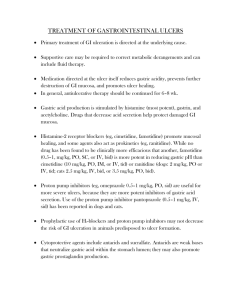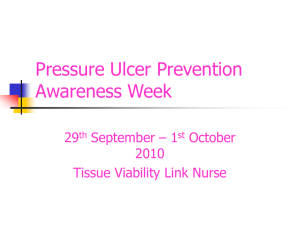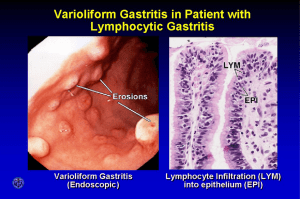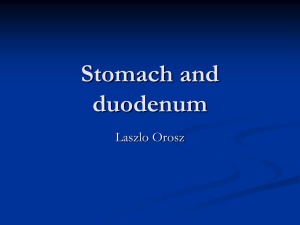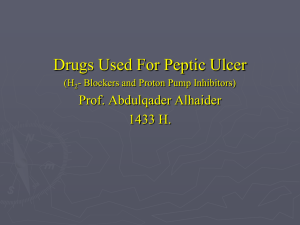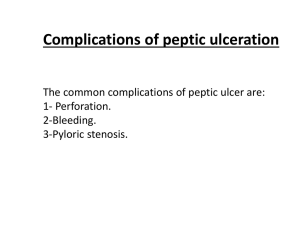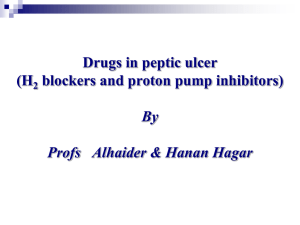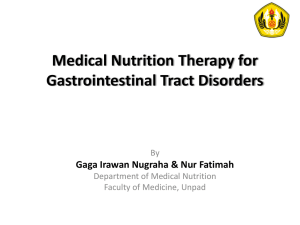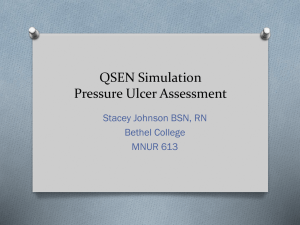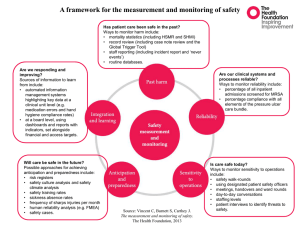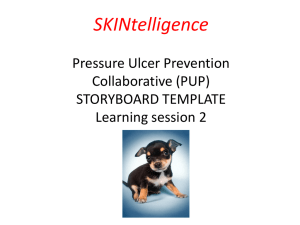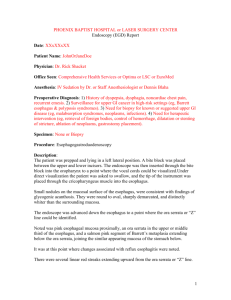Lecture 23-Stomach and Duodenum
advertisement
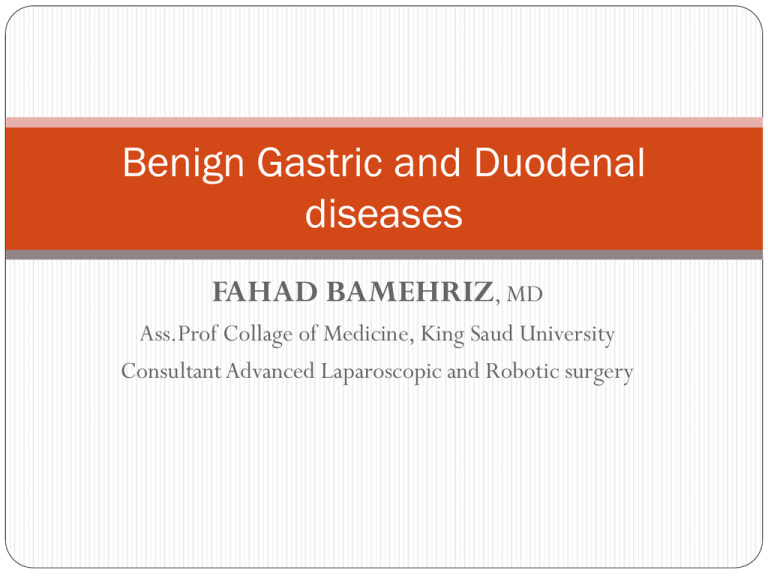
Benign Gastric and Duodenal diseases FAHAD BAMEHRIZ, MD Ass.Prof Collage of Medicine, King Saud University Consultant Advanced Laparoscopic and Robotic surgery Objectives Definition Presentation Diagnosis treatment PEPTIC ULCER Esophagus Duodenum Stomach Jejunum after surgical construction of agastrojejunostomy Ileum in relation to ectopic gastric mucosa in Meckles diverticulum Introduction Men are affected three times as often as women Duodenal ulcers are ten times more common than gastric ulcers in young patients In the older age groups the frequency is about equal Presentation - Pain - Bleeding - Perforation - Obstruction DUODENAL ULCER Epigastric area, mid-day, noon,night Relieved by food Normal or increased acid secrtion Common in young – middle age male 95% in duodenal bulb (2cm) 90% principle cause is H pylori (GNCB aeroph) Diagnosis Epigastric area pain and tenderness EGD Gastric analysis ( basal vs maximal) Gastrin serum level (severe or refractory ) Contrast meal (show complication) TREATMENT Medical Treatment (80% in 6 weeks) -H2 antagonsis (zantac……) - Proton pump inhibetors (omperazol…..) - H.pylori eradication (amoxicillin , clarithro..) Surgical Treatment I. Vagotomy II. Antrectomy and vagotomy III. Subtotal gastrectomy Complications of surgery for peptic ulcer Early Complications (leakage, bleeding, retension) Late Complications 1. 2. 3. 4. 5. 6. 7. Recurrent ulcer (marginal ulcer, stomal ulcer ,anastomotic ulcer) Gastrojejunocolic and gastrocolic fistula Dumping syndrome Alkaline gastritis Anemia (Iron defi and vitB12 …) Postvagotomy diarrhea Chronic gastroparesis ZOLLINGER-ELLISON SYNDROME (Gastrinoma) Peptic ulcer disease (often severe) in 95% Gastric hypersecretion Elevated serum gastrin Single one is malignant Multiple is benign (MEN 1) GASTRIN LEVEL IS MORE THAN 500 pg/ml C T Scan, somatostatin scan Portal vein blood sample Treatment Medical Treatment Surgical Treatment GASTRIC ULCER Epigastric area pain Increase by food Common in 40-60 years male 95% along lesser curve Types : - Type 1 : in incisura angularis & normal acid -Type 2: prepyloric and DU & high acid - Type 3: antrum duo to NSAID - Type 4: at GEJ Diagnosis Epigastric tendereness EGD Contrast swallow Treatment Medical Treatment Surgical Treatment: distal hemi gastrectomy & ulcer excision UPPER GASTROINTESTINAL HEMORRHAGE Hematemesis Melena hematochezia Causes of massive upper gastrointestinal hemorrhage Relative Incidence Common causes peptic ulcer 25% Duodenal ulcer 20% Gastric ulcer Esophageal varices Gastritis Mallory-Weiss syndrome Uncommon causes Gastric carcinoma Esophagitis Pancreatitis Hemobilia 45% 20% 20% 10% 5% MALLORY-WEISS SYNDROME 10% of UGIB 1-4cm longitudinal tear in gastric mucosa at EGJ Forceful vomiting EGD 90% bleeding stops spontaneously by cold gastric wash, EGD- cautery, surgery PYLORIC OBSTRUCTION DUE TO PEPTIC ULCER Medical Treatment Surgical Treatment PERFORATED PEPTIC ULCER Locate anteriorly High risk : female, old age, gastric one Acute presentation X-ray: free air (85%) & fill 400 cc air by NGT Treatment : NGT, ABS, Surgery STRESS GASTRODUODENITIS, STRESS ULCER & ACUTE HEMORRHAGIC GASTRITIS Stress Ulcer -----shock &sepsis Curling’s ulcers----burns Cushing’s Ulcer ----CNS tumor, injury (more to perforates, high acid production Acute Hemorrhagic Gastritis GASTRIC POLYPS Types : - Hyper plastic - Adenomatous - inflammatory Affecting distal stomach Presentation by anemia EGD R/O malignancy GASTRIC LEIOMYOMAS Common submucosal growth Asymptomatic & massive bleeding EGD & C T Scan Do not biopsy Surgical wide excision MENETRIER’S DISEASE Giant hypertrophy of the gastric rugae Present with hypoproteinemia Edema, diarrhea, weight loss Treatment : atropine, omperazole, H,pylori eradication …..rarely is gastrectomy PROLAPSE OF THE GASTRIC MUCOSA Occasionally accompanies small gastric ulcer Vomiting and abdominal pain X-ray : antral folds into duodenum Antrectomy with Billroth 1 GASTRIC VOLVULUS Its longitudinal axis( organo-axial volvulus): - More common - Associated with HH Line drawn from the mid lesser to the mid greater curvature( mesenterioaxial volvulus ) Present with : Severe abdominal pain and Brochardt”s triad Brochardt’s triad Vomiting followed by retching and then inability to vomit 2. Epigastric distention 3. Inability to pass a nasogastric tube 1. GASTRIC DIVERTICULA Uncommon Asymptomatic Weight loss, diarrhea EGD, X-ray ?? surgery BEZOAR Concretions formed in the stomach Types: - Trichobezoars: hair - Phytobezoars: vegtab Presentation by obstruction EGD, X-RAY SURGICAL REMOVAL DUODENAL DIVERTICULA 20% OF POPULATION Asymptomatic 90% medial aspect of the duodenum Rare before 40 years of age Most are solitary and 2.5 cm peri-ampullary of vater Benign Duodenal Tumors Brunner’s gland adenomas Carcinoid tumors Heterotopic gastric mucosa Villous adenomas SUPERIOR MESENTERIC ARTERY OBSTRUTION OF THE DUODENUM Obstruction of the third portion of the duodenum -- compression SMA and Aorta Appears after rapid weight loss following injury Distance between two vessels is 10-20 mm Proximal bowel obstruction symptoms and signs C T Scan bypass REGIONAL ENTERITIS OF THE STOMACH & DUODENUM Food poising Pain and diarrhea Clinical DX observation
